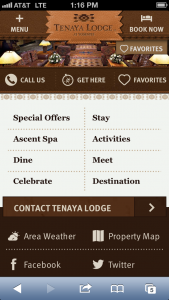Hotel management consultant Robert A. Rauch of R.A. Rauch & Associates recently hosted his second annual Hotel Forecast and Digital Marketing Conference with additional presentation by e-marketer Adam Brownstein. Brownstein is co-founder of buuteeq, a firm that provides a digital marketing system for hotels. Both presentations offered great food for thought for hospitality marketers.
In his opening, Rauch boldly stated that the information age is over and that we have entered a “digital tsunami age.” He explained that the hospitality landscape is evolving quickly as customers increasingly turn to online and mobile platforms for all forms of communication, sharing, planning and booking. But, now more than ever, the digital landscape is also driving all aspects of customer service and engagement, before, during and after a trip.
Brownstein later noted that while mobile traffic makes up 15 percent of current hotel website traffic volumes, smartphone activity has tripled in the last year alone. Approximately 30 percent of website traffic and 65 percent of same-day hotel reservations now come via mobile phones. He also noted that 57 percent of mobile users will not recommend a hotel with a bad mobile site.

What makes a good mobile site? In a nutshell, it should automatically deliver a tailored experience. A few ways to accomplish this include:
- Resizing and compressing images and enlarging text
- Displaying contact information prominently
- Linking seamlessly to maps
- Not using outdated flash technology
- Using a mobile optimized booking engine
- Running mobile-only promotions to target on-the-go travelers with last-minute deals
But having a mobile site is only one piece of the puzzle. Both Rauch and Brownstein agreed that in today’s instantaneous speed of ingesting information, a hotel’s main site and mobile site also should:
- Not skimp on high-quality photos! Photos sell a hotel even before marketing copy, with nearly 73 percent of users clicking on photos of rooms after visiting the homepage.
- Keep things simple. As soon as a guest decides a site requires too much focus, effort, or time to find what they need, they will likely move on with without booking a room.
More advice for hoteliers included making sure their brand is on social media, and providing guests the opportunity to book through every applicable platform, such as the hotel’s Facebook page. Rauch also recommended that hotels integrate their TripAdvisor feed on their website. His reasoning? TripAdvisor is a great driver of bookings but also a leak. When potential guests are forced to leave a hotel’s site to read reviews of the property, they end up also reading the competitions’. Lastly, while TripAdvisor is still the leading trusted source of travel reviews, Rauch said to keep an eye on Google. The relentless competitor has made strong forays in hospitality and therefore hotels should at the very least have a presence on Google+ and Google Places.
The lessons imparted by Rauch and Brownstein can be applied to just about any business. Is yours effectively capturing today’s digital generation?










 Grant Wright
Grant Wright Corie Fiebiger
Corie Fiebiger
 Shae Geary
Shae Geary Phelan Riessen
Phelan Riessen Katrina Early
Katrina Early Hamish Marshall
Hamish Marshall